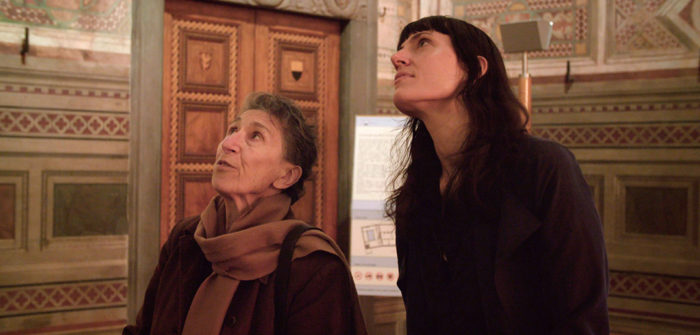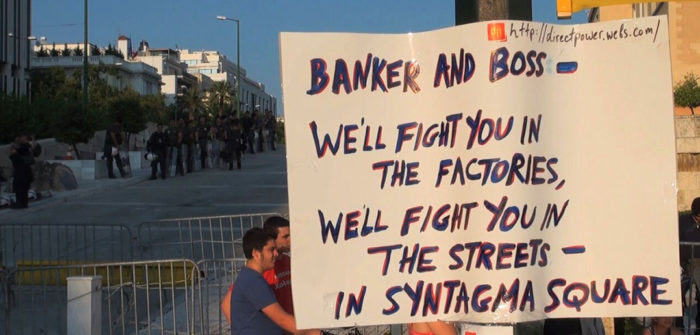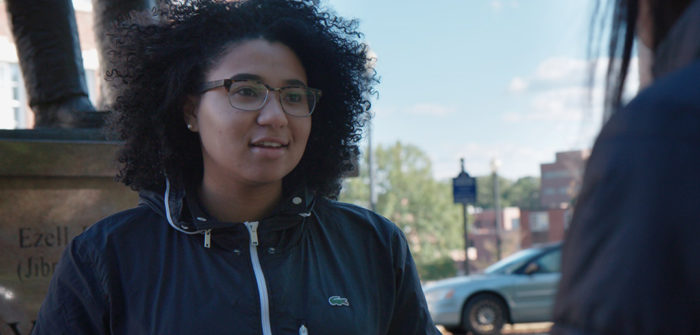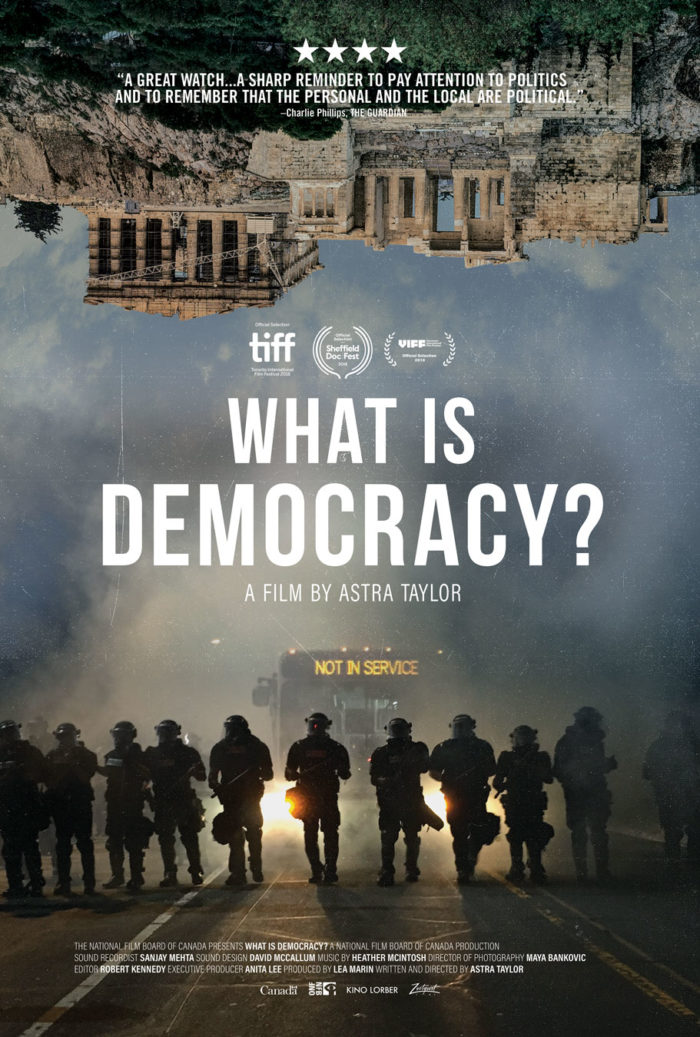As documentarian Astra Taylor prepares to bring her latest film What Is Democracy? to audiences in New York and around the country, #DirectedbyWomen had a chance to talk with her about her filmmaking process and the heightened relevance of this topic during these turbulent times.
DBW: What Is Democracy? That’s an enormous question! I’d love to hear about how you came to choose this project and what helped guide you as you worked to shape the film.
AT: In 2011 and 2012 I was finishing a book about why the Internet hadn’t lived up to its democratic potential and also participating in Occupy Wall Street, which was all about the way our political system has failed us, and those two experiences had me musing on the problem of democracy. I felt a film would be a good format to tackle the topic, because the theme of democracy naturally lends itself to a polyphony of voices. I also wanted to make a philosophical film that was a bit looser and more digressive than my last one, Examined Life, which is organized into rather tidy chapters. So I knew the sort of theoretical concepts and political issues I wanted to cover (inequality, globalization, immigration, racism, voting rights, for example), but I was also open to following my nose and giving space to people I met to express themselves. That said, given how big and potentially overwhelming the titular question is, I knew I had to ground the film in my perspective and way of seeing the world — which isn’t to say it’s a personal film or that I’m the narrator, because that’s not the case. But the movie is very idiosyncratic and I’m present throughout, even if my presence is subtle. The film is not pretending to be objective or exhaustive. It’s not a chronological narrative or an exposé, it’s an inquiry, and I’m asking people to join me on this philosophical quest.

DBW: There are some riveting moments in the film where you engage in dialogue with scholars and activists who have spent enormous amounts of time contemplating democracy. The emphasis on conversing together to get to the heart of what democracy is and how it functions made it clear to me that this is a film about exploration rather than exposition! What’s at the heart of that exploration?
AT: Exploration rather than an exposition — well put! Indeed, I see the essence of philosophy as constant questioning and an unsettling of our assumptions. Democracy needs philosophy, it needs us to reflect and deliberate. As I say in the film, democracy demands we collectively come together and ask the Socratic question, How should we live? And that questioning is never finished, we don’t figure it out and go home, which is why the final shot of the film is of myself and the scholar Silvia Federici, still lost in conversation, still wrestling with ideas. But I also just think the film would be boring if it were pure exposition. Who wants to be told what to think? And it would be a lie. You can’t definitively diagnose, let alone cure, what ails democracy in under two hours. But you can raise interesting questions and allow the viewer space to see things from new angles and invite them to think for themselves.
DBW: There are also moments in the film where you engage with everyday people who have clearly not given democracy much (or any) thought. This stands in stark contrast to the scholarly and activist conversations. Was this something you had in mind from the beginning of the project or did it evolve as you moved forward? Can you share about how that unfolded and how these interactions impacted your thought about the project?
AT: If you talk to people about democracy you will encounter a whole range of responses, from totally tuned out to racist to interesting to downright brilliant. I had to show the array, and not pretend like people are always good democratic citizens, because that’s not the case. But a lot of everyday people I met were pretty amazing, including the young kids I spoke to. By the end of the filming process I was actually more convinced of people’s capacities than I was going in to the project. But I think we have a system that doesn’t encourage people to think much about democracy and doesn’t allow them to nurture their democratic capacities. Instead, we’re supposed to pull a lever every couple of years for a celebrity candidate and then get out of the way. That’s not the people ruling by any stretch of the imagination.

DBW: Did you find yourself coming to new understandings about what democracy is as you worked on the film? If so, are there any insights you could share?
AT: I think we need to put equality at the heart of our conception of democracy. Lots of people told me democracy was freedom. No one told me it was equality. But you can’t have one without the other.
DBW: Any thoughts on the current political climate in relationship to your film and democracy in general?
AT: When I began this film I had no idea that democracy would eventually strike people as such an urgent topic. In 2013 and 2014, when I was writing the proposal, the mood was so much more complacent, despite the fact there were some protest movements afoot, particular around climate change and racial justice. I feel very lucky that my producer, Lea Marin, was willing to sign on to the project with such enthusiasm at that time. My sense is that we can’t separate the current sense of crisis from that preceding atmosphere of complacency. Too many people took democracy for granted. They thought maintaining and advancing it was someone else’s job—and here we are….


DBW: What’s next? Will you be participating in post screening Q&As? What are you envisioning as your film reaches new audiences?
AT: Yes, I’ll be attending as many screenings, in person or via Skype, as possible. I’m lucky to have Zeitgeist Films releasing it in the US and the National of Film Board of Canada behind it up north. I’m really hoping that, after it’s theatrical run, it has a good life on campuses and in classrooms and that it is also used by community groups. I also have a companion book coming out in May, where I dig more deeply into some of the issues the film raises in case people are hungry for more.
DBW: Thanks for taking time to engage. I know you’re quite busy as you prepare to open What Is Democracy? in NYC and around the country. I hope the screenings spark thoughtful conversation.
![Astra Taylor [Photo by Deborah Degraffenried]](https://directedbywomen.com/wp-content/uploads/2019/01/WhatisDemocracy_AstraTaylor-700x837.jpg)

What Is Democracy? opens January 16, 2019 at IFC Center in New York followed by theatrical engagements nationwide. Follow What Is Democracy? on the film’s website, and Astra Taylor on Facebook and Twitter.




You must be logged in to post a comment.